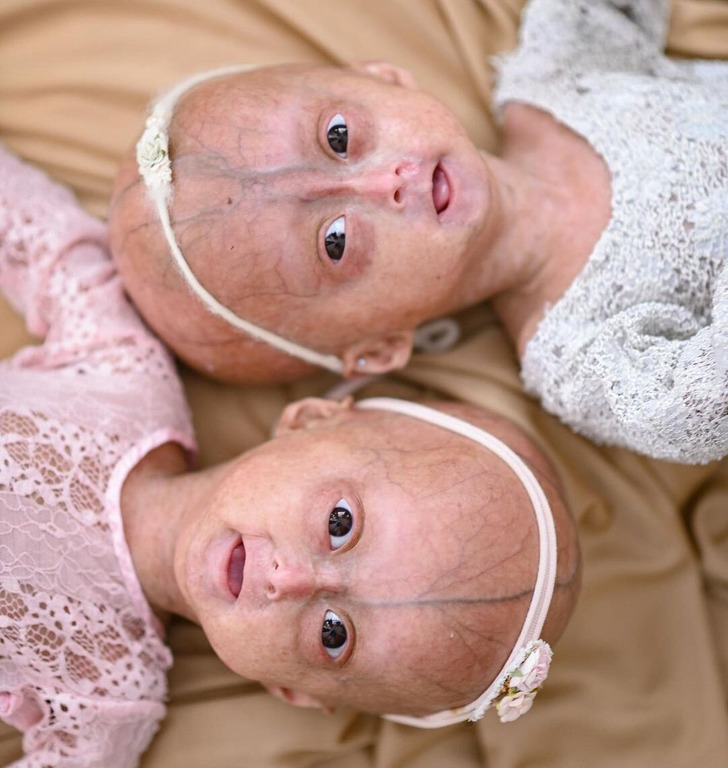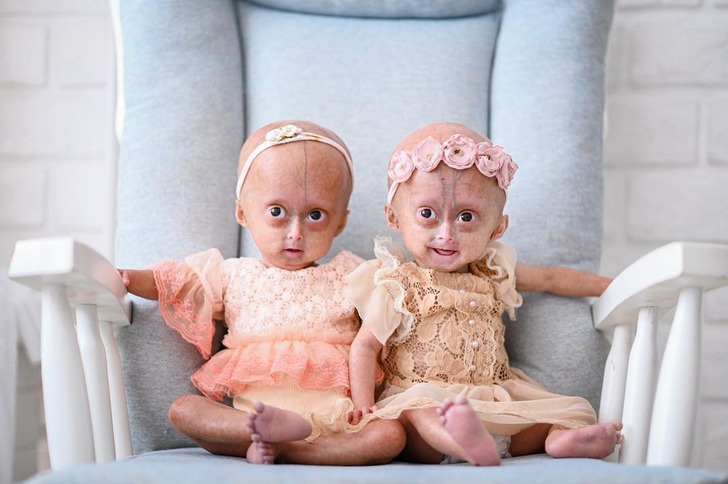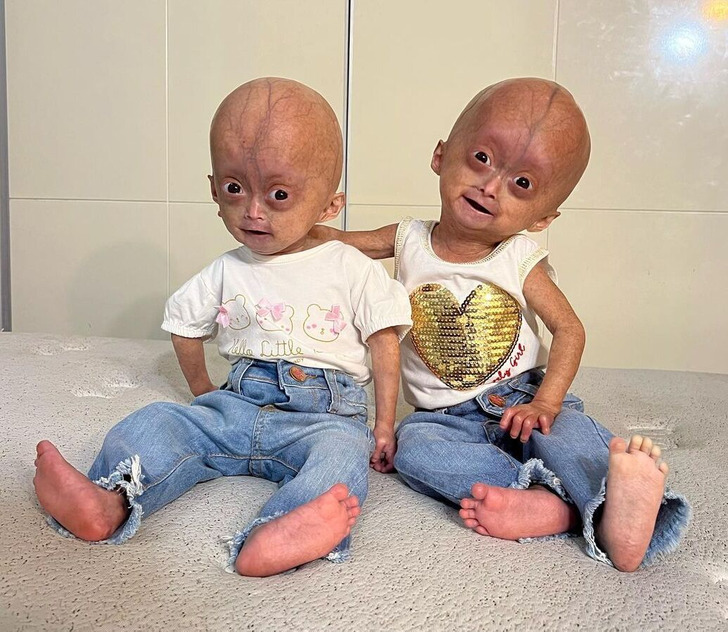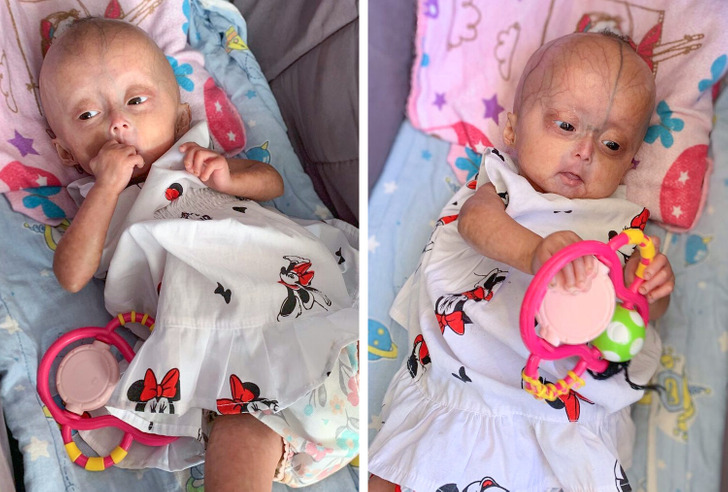Awww,so cute ♥️♥️
Meet the Twins With the Rare Benjamin Button Syndrome
In a small town in Brazil, a remarkable pair of identical twins, Elis and Eloá, have become an inspiring symbol of resilience and the extraordinary power of the human spirit. Born with Hutchinson-Gilford Progeria Syndrome, a rare and fatal genetic condition that accelerates aging, these twins are navigating their challenging journey with a grace and strength that has captured the hearts of many around the world.
Understanding Hutchinson-Gilford Progeria syndrome
HGPS is an exceptionally rare disorder, affecting approximately 1 in 20 million newborns worldwide. Characterized by rapid aging beginning in early childhood, children with progeria typically exhibit growth delays, loss of body fat and hair, aged-looking skin, stiffness of joints, and severe cardiovascular disease. The average life expectancy for those with HGPS is around 14.5 years, though some may live into their late teens or early twenties. This syndrome became popular with the movie The Curious Case of Benjamin Button.
The condition is caused by a mutation in the LMNA gene, which produces the lamin A protein responsible for maintaining the structural integrity of the cell nucleus. The mutation results in the production of an abnormal version of the protein, called progerin, which causes cells to become unstable and die prematurely.
Elis and Eloá’s journey

Just for the record social media is the way now to make money in these times.....I hope the girls and Guilherme and he's mum make a lot of money to buy nice things...they certainly deserve the world....
Elis and Eloá quickly drew attention due to their unique medical condition. Despite the physical challenges posed by progeria, their infectious smiles and unwavering optimism have become a source of hope and inspiration. The twins' parents, Guilherme and Elismar, have devoted their lives to providing the best care possible for their daughters, ensuring that they live as normal a life as possible despite the constraints of their condition.
The family's journey has not been easy. Daily life involves rigorous routines of medical care, including physiotherapy, to manage joint stiffness and maintain mobility. Yet, Elis and Eloá face each day with remarkable courage and a zest for life that is truly extraordinary.
A global community of support

🇦🇺 Australia loves this family and Guilherme is just a gorgeous humanbeing and he's there brother not there dad...
Elis and Eloá's story has resonated with people around the globe. This led to a groundswell of support from individuals and organizations dedicated to raising awareness about progeria and supporting research efforts. The Progeria Research Foundation, a key organization in this field, has been instrumental in advancing research and providing resources for families affected by the condition.
Through social media platforms, the twins' journey is shared with a broad audience, fostering a sense of community and solidarity. Their family's updates, documenting both the highs and lows of their daily lives, provide invaluable insights into the realities of living with progeria, while also spreading a message of hope and perseverance.
Advances in research and hope for the future
Significant steps have been made in understanding and treating progeria in recent years. In 2020, the U.S. Food and Drug Administration (FDA) approved the first treatment for progeria, a drug called lonafarnib. This medication has been shown to extend the lives of children with progeria by reducing the buildup of progerin in cells, thus slowing down the progression of the disease.
While there is still no cure, ongoing research holds promise. Scientists are exploring gene editing techniques, such as CRISPR, as potential avenues for correcting the genetic mutation at the source. For families like that of Elis and Eloá, these advancements offer a glimmer of hope for the future.
Elis and Eloá exemplify the extraordinary resilience of the human spirit. Their story reminds us all of the power of love, community, and scientific advancement in the face of seemingly invincible challenges. As they continue to defy the odds, they inspire countless individuals around the world to cherish every moment and never lose hope, no matter how daunting the obstacles may seem.
Comments
they are such beautiful baby girls, momma should be proud
Why haven't we seen any current photos of the girls? Are they ok?
I watch Eloa and Elise daily, and I agree that sometimes I feel their needs are not being met, but at other times they are being fully met. I'm also torn when I sense one is receiving more attention than the other, or is vying for attention but does not receive it, and wondered if they didn't have the syndrome,whether I would be so emotionally attached to their actions and reactions. I am not sure why I'm so addicted to watching them.. I tend not to watch the videos where I sense their impediment is being exploited, in favour of more natural and organic videos involving them. I have grown to love them, and although I cannot tell how old they are, I love how beautiful they are, although one appears to be a little aggressive and spiteful, but sibling rivalry is in many families. Thanks for sharing them with the world.
Did one of the twins die there are a lot of rumors
Sorry but both girls have passed. Back in 1990, one month apart.
Related Reads
I Heard a Secret Conversation Between My Husband and His Work Buddy — I’ve Never Been This Humiliated

Demi Moore, 61, Stuns in a Tiny Bikini With Her Granddaughter and Shocks Fans

“1000-lb Sisters” Star Stuns in a Swimsuit After Dramatic Transformation and Looks Unrecognizable

I Refused to Attend My Son’s Wedding And Instead Spent the Day With His Ex-Wife

I Can’t Believe What My Ex-Husband Asked Our Daughter to Do

20 Hotel Experiences That Definitely Deserve a Refund

10 People Reveal Their “Don’t Tell Mom About This” Moments

15 Short Stories About Relationships With the Endings That You Don’t Expect

10+ Spine-Tingling Mysteries That Will Shake You to Your Core

My Son Brought His Fiancée Home — What I Discovered Made Me Call the Police

12 Stories That Show Peace Is a Myth When Family Is Involved

My MIL Sabotaged My Wedding Dress but I Rewrote Her Family History


